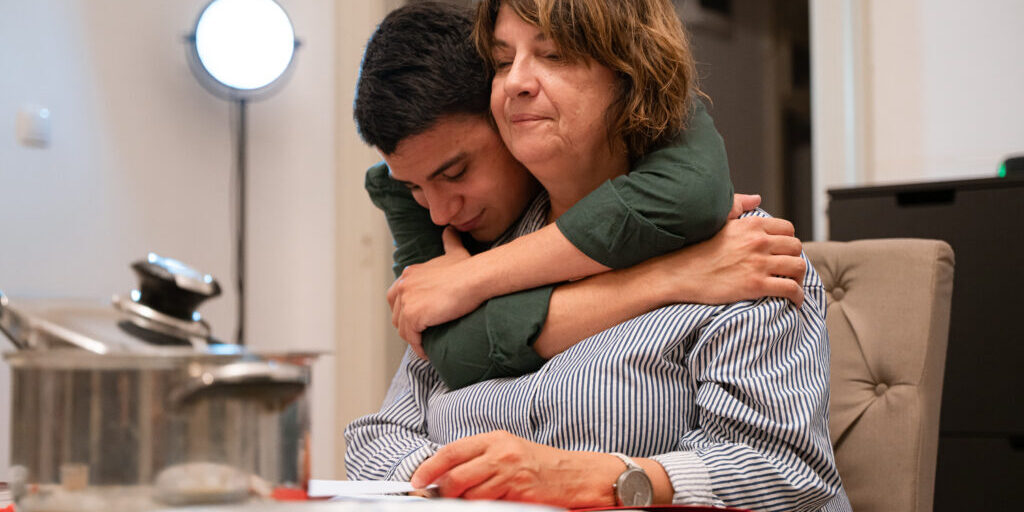Heartefact, premiered June 2022 (presented as part of the Kosovo Theatre Showcase)
A man and a woman await their son’s arrival. It’s been a while since he was last home. There is a soup pot on the stove and a lasagne sitting in the kitchen. But they don’t seem wholly enthused by his imminent return, in fact they are visibly apprehensive. Tension hangs in the air like cigarette smoke in a kafana. Because once their son comes back, they will be forced to confront the truth of who he is; that he is gay, something which they cannot bring themselves to accept. In his absence, they have turned his sexuality into a wall that sits between them, an insurmountable obstacle,
Patrik Lazić’s nuanced and moving autobiographical play charts the awkward, occasionally drily amusing, often deeply painful conversations that follow the arrival of their son (Amar Ćorović) in the family home with a wheeled suitcase in tow and gifts for his nephews and nieces. (His sister is already married with children, one of many things his parents fear he will never have for himself. Who, they ask, will look after him when he is old?).
To make matters worse his parents (played with conviction by Dragana Varagić and Aleksandar Đinđić) have got hold of a copy of a book by Richard Cohen, the notorious American psychologist who argues that homosexuality is something that can be cured, that he has in fact cured himself and is now a happily married member of the ‘ex-gay’ community. His mother clings to this idea like a life raft, needing desperately to believe that her son’s sexuality is something he could resist if only he tried hard enough. His parents grope around for reasons for why their son has turned out the way he has. They assign blame to one another, because in their eyes someone has to take the blame. Perhaps it is the result of trauma incurred in the womb during the war years. Maybe it is because they permitted him to dress up as Croatian pop star Severina as a young boy. Perhaps all be well if he just played a bit more football. Perhaps he has fallen under the influence of the wrong crowd. Perhaps he has been contaminated by artists. (Perhaps he has sometimes asked himself these questions).
Over the next hour or so conversation circles through recrimination, anger, reflection, hope, hurt. Shame plays a large part in this. They rake over old arguments and dredge up past pain as the lasagne congeals on the dinner plates and the salad bowl is hurled to the floor in frustration. To complicate things the son’s ‘roommate’ Nikola is waiting outside for the right time to make his entrance.
The playing space is one of intimacy, replicating the domestic setting with the audience seated around the central dinner table, and the surtitles appearing on the television screen. For the purposes of the Kosovo Theatre Showcase the play is performed in the lapidarium of the National Museum in Prishtina, but in previous performances it has been staged in real apartments, no doubt enhancing the sense of intrusion into a family argument. The house lights remain on throughout, bright and harsh, so the audience can see each other’s faces and the glint of tears in Varagić’s eyes.
Lazić for the most part keeps things emotionally grounded and avoids melodrama. Though the parents are divorced, they have an amicable relationship and seem relatively close. The mother mocks her ex’s mid-life crisis decision to dye his hair and he asks after her health. They are not slaves to convention, that much is clear. They are trying to be understanding. And yet still they cannot accept the fact their son for who he is. Over the course of the play the emotional tone shifts constantly. It is often very funny, the humour fuelled by his parents’ misconceptions and miscomprehensions as they awkwardly discuss gay porn and hormones. But, at heart, it’s just very sad.
An almost throwaway remark about not wanting Nikola’s presence to upset the brother-in-law fees like a tipping point for Patrik. His wellbeing, his happiness, is secondary. You can see the reality of this sinking in on Ćorović’s face.
All three actors convey their characters’ complex pent-up emotions, the things that have been left to simmer like that soup in the kitchen, as well as the affection that exists between them however clumsily expressed. There is love here in this room, which is why it hurts so much. There’s a particular rawness to Varagić,’s performance, maternal turmoil written on her face as she slams her hand hard against the table.
Even before his character enters the scene, Ćorović paces the space like a spectator from the future looking back on the past. He’s present even when he is absent, observing, an avatar. Occasionally he or one of the parents will break off midway through to question whether events are being misremembered, to ask whether the more traumatic aspects are being downplayed or distorted, in other places, exaggerated for dramatic purposes. The parents often protest at the way they are being portrayed. It wasn’t like this; we weren’t like this.
While the play feels highly personal, Lazić uses it to speak to wider societal issues, premiering in a year during which the Europride parade in Belgrade was used as a political football and distraction tactic by hypocritical Serbian politicians. The ‘our’ of the title extends far beyond this one apartment, and this conversation is no doubt one that has been played out in rooms around the Balkans and beyond, something underlined by the occasional moments when audience members are called upon to read lines of the parents’ dialogue.
While Lazić’s play contains clear parallels with Edouard Louis’ oft-adapted autobiographical novel The End of Eddy, about a young man growing up gay in the oppressive environment of a small working class French town, it also echoes Ibsen’s A Doll’s House, as Patrik gradually comes to understand that in order to live and love freely, to be complete, to be seen, he cannot stay here. No matter what he says, his parents are not (yet) in a place where they are ready to accept him. Like Nora, he has to walk away, to close the door (for now at least), to take control of his own story.
Credits:
Written and directed by: Patrik Lazić
Cast: Dragana Varagić, Aleksandar Đinđić, Amar Ćorović
Producer: Heartefact
For tickets and more info, visit: Heartefact.org
Natasha Tripney is a writer, editor and critic based in London and Belgrade. She is the international editor for The Stage, the newspaper of the UK theatre industry. In 2011, she co-founded Exeunt, an online theatre magazine, which she edited until 2016. She is a contributor to the Guardian, Evening Standard, the BBC, Tortoise and Kosovo 2.0








